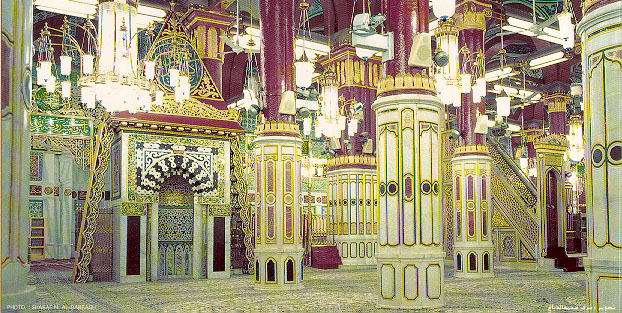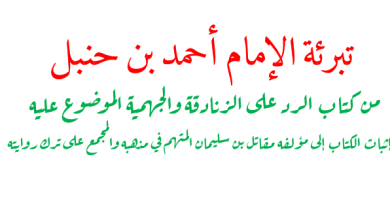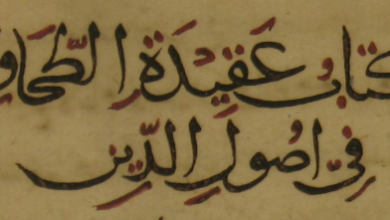Imām Abū Ḥanīfa’s Autograph Copy of al-Fiqh al-Akbar: The 6th Century Manuscript Discovery and Fifty Attestations of his Authorship
This study undertakes a comprehensive examination of one of the most contested questions in Islamic intellectual history: the authorship of al-Fiqh al-Akbar, traditionally attributed to Imām Abū Ḥanīfa (d. 150 AH / 767 CE). While this foundational text of Sunni creed has shaped Islamic theological discourse for over a millennium, a small minority has questioned the authenticity of its attribution to Imam Abu Hanifa, citing suspected anachronisms in parts of its textual wording and concerns about the reliability of the chains of transmission. This work seeks to address some of these doubts through a systematic analysis of both manuscript evidence and scholarly testimony spanning ten centuries.
The opening section will examine the assumption underlying some modern criticisms—that Imām Abū Ḥanīfa transmitted knowledge exclusively through oral instruction and composed no written works. Through careful analysis of historical reports and biographical accounts, it will be demonstrated that Imām Abū Ḥanīfa did indeed produce written texts that circulated among his students. This contextual foundation is essential for establishing the plausibility of his authorship of al-Fiqh al-Akbar and understanding the treatise within the intellectual environment of the second Islamic century onwards.
The study will also mention the two principal transmissions of al-Fiqh al-Akbar: one through Ḥammād ibn Abī Ḥanīfa, the Imām’s son, and another through Abū Muṭīʿ al-Balkhī, his student. Additionally, the terminological significance of “al-Fiqh al-Akbar” in early Islamic discourse will be explored, clarifying how this phrase distinguished matters of creed from jurisprudence, thereby situating the treatise within its proper discursive context.
At the heart of this study lies the presentation of a remarkable codicological discovery: marginal annotations found within a commentary on al-Fiqh al-Akbar by Shaykh ʿUmar ibn Muṣṭafā al-Āmidī al-Diyār Bakrī (d. 1263 AH) document the historically significant discovery of what was identified as Imām Abū Ḥanīfa’s autograph manuscript of al-Fiqh al-Akbar, reportedly uncovered in Kufa, Iraq, during the year 600 AH.
Detailed codicological analysis of this manuscript will be provided, examining its physical features, provenance, and the scholarly annotations it bears. Particular attention will be given to the attestations of authenticity made by scholars, which links al-Fiqh al-Akbar to an unbroken chain of scholarly validation extending across over ten centuries.
To assess the significance of the manuscript evidence, the scholarly credentials of the key figures involved in its authentication will be examined, including Imām Muḥammad Murṭaḍā al-Zabīdī (d. 1205 AH) and Shaykh ʿUmar ibn Muṣṭafā al-Āmidī al-Diyār Bakrī. Through biographical analysis and validatory testimonies, their reputations for precision, reliability, and scholarly integrity will be established, thereby demonstrating the weight their attestations carry for the authentication of al-Fiqh al-Akbar to be definitively by the pen of Imām Abū Ḥanīfa.
The largest section of this work will present a comprehensive survey of fifty scholarly attestations affirming Imām Abū Ḥanīfa’s authorship of al-Fiqh al-Akbar, arranged chronologically from the 4th century AH to the modern period. Beginning with early authorities such as Ibn al-Nadīm and ʿAbd al-Qāhir al-Baghdādī, and extending through later jurists, theologians, historians, and bibliographers, this survey will demonstrate the remarkable continuity of recognition across time and geography. The testimonies encompass scholars from Iraq, Syria, Egypt, Khurasan, Central Asia, the Indian Subcontinent, and the Ottoman domains, representing not only the Ḥanafī school but also leading authorities from the Shāfiʿī and Ḥanbalī traditions, as well as figures recognised in contemporary Salafī scholarship.
The broader significance of this cross-school (madhhab) recognition will be analysed, demonstrating that affirmation of Imām Abū Ḥanīfa’s authorship was not merely an internal Ḥanafī claim but represented genuinely dominant scholarly acceptance spanning the Sunni tradition. This breadth of acceptance reveals how al-Fiqh al-Akbar became embedded in the collective heritage of Sunni orthodoxy and challenges interpretations that dismiss its attribution.
This work will synthesise the manuscript and testimonial evidence to reflect on their implications for understanding how Islamic orthodoxy was constructed, verified, and transmitted in relation to al-Fiqh al-Akbar and its major commentaries. It will be argued that textual authenticity in the Islamic tradition was preserved through multiple, reinforcing mechanisms: codicological preservation, chains of transmission, scholarly validation, and repeated cross-generational affirmation. The case of al-Fiqh al-Akbar thus exemplifies the sophisticated processes by which some early Islamic texts achieved canonical status and demonstrates the necessity of combining textual criticism with intellectual history in the study of disputed attributions.
Chronological Attestations of Imām Abū Ḥanīfa’s al-Fiqh al-Akbar:
| Century AH | Scholar | Death Date (AH / CE) |
| 5th | ʿAbd al-Qāhir al-Baghdādī | 429 AH / 1037 CE |
| 5th | Ṣāʿid al-Ustawāʾī al-Naysābūrī | 432 AH / 1040 CE |
| 5th | Abū al-Faraj ibn Abī Ya’qūb al-Nadīm | 438 AH / 1046 CE |
| 5th | Aḥmad ibn Muḥammad al-Nāṭifī | 446 AH / 1054 CE |
| 5th | Abū al-Muẓaffar al-Isfarāʾīnī | 471 AH / 1078 CE |
| 5th | Fakhr al-Islām al-Bazdawī | 482 AH / 1089 CE |
| 5th | Abū al-Yusr Muhammad al-Bazdawī | 493 AH / 1099 CE |
| 6th | Abū al-Mu’īn al-Nasafī | 508 AH / 1115 CE |
| 6th | Abū Isḥāq al-Ṣaffār | 534 AH / 1139 CE |
| 6th | ‘Aṭā’ al-Jūzjānī | before 565 AH / 1169 CE |
| 6th | Muḥammad Kardarī al-Barātqīnī | 642 AH / 1244 CE |
| 7th | Mankūbars al-Nāṣirī | 652 AH / 1254 CE |
| 7th | ʿAbd al-ʿAẓīm al-Mundhirī | 656 AH / 1258 CE |
| 7th | Alī ibn Muḥammad al-Rāmushī | 667 AH / 1268 CE |
| 7th | Masʿūd ibn Shayba al-Sindī | c. 7th century AH |
| 8th | Ḥāfiẓ al-Dīn al-Nasafī | 710 AH / 1310 CE |
| 8th | Ḥuṣām al-Dīn al-Sighnāqī | 714 AH / 1314 CE |
| 8th | Ibn Taymiyya | 728 AH / 1328 CE |
| 8th | Alāʾ al-Dīn al-Bukhārī | 730 AH / 1330 CE |
| 8th | Shams al-Dīn al-Dhahabī | 748 AH / 1348 CE |
| 8th | Ibn Qayyim al-Jawziyya | 751 AH / 1350 CE |
| 8th | ʿAbd al-Qādir al-Qurashī | 775 AH / 1373 CE |
| 8th | Akmal al-Dīn al-Bābartī | 786 AH / 1384 CE |
| 8th | Ṣadr al-Dīn ibn Abī al-ʿIzz | 792 AH / 1389 CE |
| 8th | Badr al-Dīn al-Zarkashī | 794 AH / 1391 CE |
| 9th | Muḥammad al-Kardarī | 827 AH / 1423 CE |
| 9th | Ibn Nāṣir al-Dīn al-Dimashqī | 842 AH / 1438 CE |
| 9th | Ibn Ḥajar al-ʿAsqalānī | 852 AH / 1449 CE |
| 9th | Badr al-Dīn al-ʿAynī | 855 AH / 1451 CE |
| 9th | Qāsim ibn Quṭlūbughā | 879 AH / 1474 CE |
| 9th & 10th | Ilyās ibn Ibrāhīm al-Sīnūbī Isḥāq al-Ḥakīm al-Rūmī Muḥammad ibn Bahāʾ al-Dīn | 891 AH / 1486 CE 950 AH / 1543 CE 956 AH / 1549 CE |
| 10th | Aḥmad Ṭāsh Kubrī Zādah | 968 AH / 1560 CE |
| 10th | Abū al-Muntahā al-Maghnīsāwī | 1000 AH / 1591 CE |
| 11th | ʿAlī al-Qārī | 1014 AH / 1606 CE |
| 11th | Marʿī al-Karmī al-Ḥanbalī | 1033 AH / 1624 CE |
| 11th | Ḥajjī Khalīfa | 1067 AH / 1657 CE |
| 11th | Kamāl al-Dīn al-Bayāḍī Zādah | 1098 AH / 1687 CE |
| 12th | Abū Saʿīd al-Khādimī al-Ḥanafī | 1156 AH / 1743 CE |
| 12th | Muhammad Murtaḍā al-Zabīdī | 1205 AH / 1791 CE |
| 13th | ʿAbd al-ʿAlī al-Laknawī | 1225 AH / 1810 CE |
| 13th | ʿUmar ibn Muṣṭafā al-Āmidī al-Diyār Bakrī | 1263 AH / 1847 CE |
| 13th | ʿAbd al-Qādir al-Sylhetī | 1297 AH / 1880 CE |
| 14th | ʿAbd al-Ḥayy al-Laknawī | 1304 AH / 1886 CE |
| 14th | Muḥammad Zāhid al-Kawtharī | 1371 AH / 1952 CE |
| 15th | ʿAbd al-Rashīd Nuʿmānī | 1417 AH / 1999 CE |
| 15th | Wahbī Sulaymān Ghāwjī al-Albānī | 1434 AH / 2013 CE |
| 15th | Ināyatullāh Iblāgh | 1440 AH / 2019 CE |
Download the full pdf – HERE
Follow the Telegram for updates: https://t.me/Darul_Tahqiq






